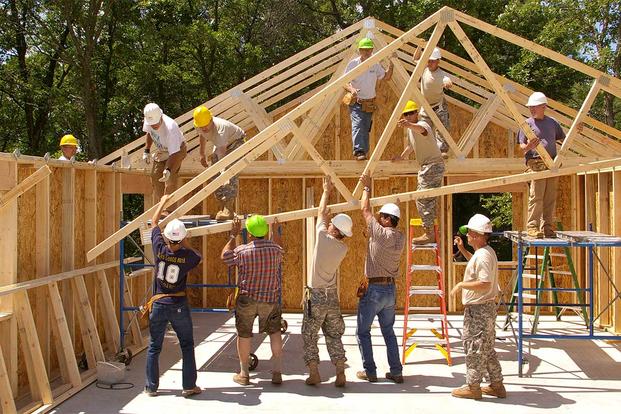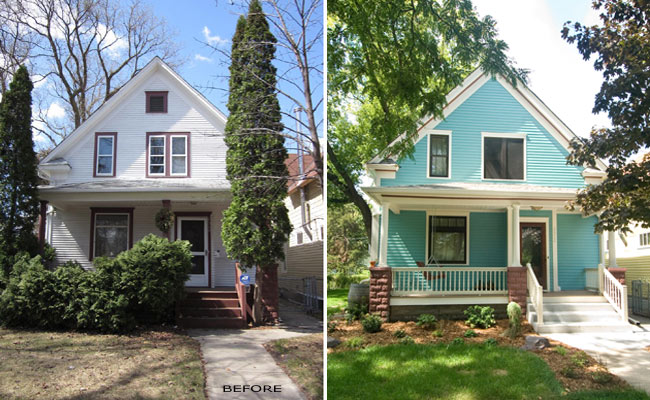VA Home Loans in Fidelity Illinois
For eligible veterans and active duty military personnel a Fidelity VA mortgage loan can be a wonderful benefit to take advantage of. The Department of Veterans Affairs guarantees these loans, which can finance as much as 100% of the value of the property, ensuring low rates and easier qualification guidelines when compared to conventional loans.
Fidelity VA Benefits
In addition to the excellent VA mortgage rates, and no money down option there are a number of advantages to obtaining a Fidelity VA home loan, such as:
- Buy a Fidelity Home with No Down Payment
- Refinance up to 120% of your Home’s Value
- Use your VA Benefits even if you used them in the past
- Ask us how we can pay for your pest inspection
- No mortgage insurance premiums

Get Pre-Approved for a Fidelity VA Home Loan
Fidelity VA One Time Construction to Close
Building a Fidelity home might be complicated, but financing it doesn’t have to be. This is where our One-Time Close Construction to Permanent Loan comes in. Financing the land and construction in two phases seems a little cumbersome to us. Rather than one closing prior to breaking ground, and then a second closing prior to move in day, this program has just one closing. In one settlement the financing for the construction, lot purchase (if not already owned), and permanent loan are all arranged.
Benefits of a Fidelity One Time Close Construction to Permanent Loan.
One appraisal, one set of closing costs, one underwriting and approval process…Eliminating the redundancy of a second closing reduces all of these costs, potentially saving the borrowers time and money when it counts.
Because the interest rate is locked in prior to the single closing and before the start of building, it eliminates the concern that rates could rise during construction. Any increase in rates could make the home less affordable or even jeopardize loan approval if ratios are tight.
Once the loan is finalized, the payments don’t start until the home is complete. This is a huge selling point for many buyers who need to pay for another place to live until they can move into the new property.
Once the closing is complete and the loan is in place, borrowers don’t have to worry about re-qualifying. With many traditional construction to permanent loans, the buyers will have to re-qualify at the end of the construction phase. Now the buyers can enjoy preparing for life in the new home without concern that purchasing new furniture or other items could impact their loan approval.

Fidelity VA Mortgage Hotline 888-882-1058

VA Renovation Hotline 888-882-1058
Fidelity VA Renovation Loan
The VA Renovation Loan brings together some of the most innovative and attractive features of several popular mortgage programs. It provides no money down financing that covers not only the current value of the property, but the cost of remodeling and repairs as well. This program is intended for minor updates and work done on the home at a cost under $50,000, with no minimum renovation cost requirement. Because the Veteran Administration requires that a property meet minimum property standards in order to qualify for Fidelity VA financing, it is not uncommon for deals to fall through during the inspection phase. The seller may not want to pay for all the repairs needed to ensure the home meets the VA’s high standards. With a Fidelity VA Renovation Loan the buyers may be able to move forward with the purchase of a home they love, while borrowing the additional funds needed to fix the issues with the property, still with zero down payment.
[adm-seo-meister-maps location=”Fidelity” locationlat=”36.219277″ locationlng=”-94.153163″ zoom=”16″ schemaname=”Fidelity” schemamaptypes=”” schemaurl=”https://www.google.com.np/maps/place/Fidelity/@36.219277,-94.153163″ ]
Fidelity is the quality of faithfulness or loyalty. Its original meaning regarded duty in a broader sense than the related concept of fealty. Both derive from the Latin word fidēlis, meaning “faithful or loyal”. In the City of London financial markets it has traditionally been used in the sense encompassed in the motto “My word is my bond”.
In audio, “fidelity” denotes how accurately a copy reproduces its source. For example, a worn gramophone I record will have a lower fidelity than one in good condition, and a recording made by a low budget record company in the early 20th century is likely to have significantly less audio fidelity than a good modern recording. In the 1950s, the terms “high fidelity” or “hi-fi” were popularized for equipment and recordings which exhibited more accurate sound reproduction. Similarly in electronics, fidelity refers to the correspondence of the output signal to the input signal, rather than sound quality, as in the popular internet connection technology “Wi-Fi”.
[adm-seo-meister-interlinkingshortcode cid=”4″ counts=”16″ types=”bullet” label=”” label1=”city” label2=”” label3=”” label4=”” label5=”” label6=”” label7=”” label8=”” label9=”” labelbefore=”” labelafter1=”Illinois VA Loan” labelafter2=”” labelafter3=”” labelafter4=”” labelafter5=”” labelafter6=”” labelafter7=”” labelafter8=”” labelafter9=”” method= “randoms” columns=”4″]
